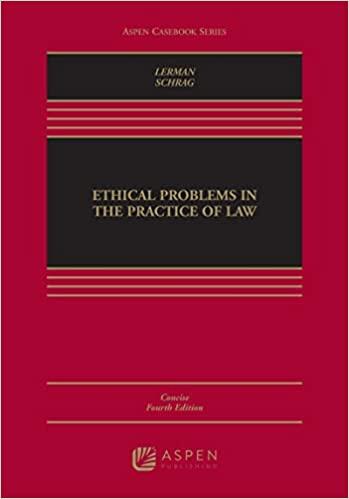Question
Question 3 CASE STUDY As per the contracts Act 1999 (section 18A) and the Sale OF Goods Act 1979 (section 14) word of mouth may
Question 3
CASE STUDY As per the contracts Act 1999 (section 18A) and the Sale OF Goods Act 1979 (section 14) word of mouth may be considered as a contract. Breach of the contract is equally punishable like breach of written contract. As evident from the Air Studios (Lyndhurst) Limited T/A Entertainment Group v Lombard North Central PLC (2012), the loss amount is liable to be paid by the Shocks on Us company. As per the oral modification clause of the Word of mouth Law, Richard is liable to receive the compensation amount if he is able to substantiate his loss amount via written documents2.
Again, in the second case a reference from the Thomas KELLOGG v. Cindy SHUSHEREBA (2013) case may be considered. Oren was forced to pay the alleged amount in that case. By the standards of the case Landlord and Tenant Act 1985 (Section 18), Richard is liable to pay the extra $3000 if the house owner George approaches the court and disagrees any wave off agreement. However, in case if Richard can produce any witness of the verbal assurance of George, the payable amount for him may lessen3.
Thirdly the example of the Uber v Aslam case may be cited. The appeal of the Uber drivers did not stand in front of the employment tribunal. As per this case, the issue of not accepting the pre-booked product may be considered. The issue is that Tom did not sign any purchase clause with Richard. As per the Product liability and safety law it is essential to seal a contract with a buyer at the confirmation of the purchase. Since, this was not done; the court is more likely to reject Richard's appeal if he rings the court4.
In order to shed light upon the final case the Bolton v Mahadeva [1972] case may be considered. The appellant, in this case, received the contracted value minus the cost of defects. Similarly, in this case, Martin may also appeal that Richard has not kept his words. However, considering the frivolity of the case, the judge may ask the accused and the appellants to solve the dispute among them. As per the contracts Act 1999 (section 18A) and the Sale OF Goods Act 1979 (section 14) word of mouth may be considered as a contract. Breach of the contract is equally punishable like breach of written contract. As evident from the Air Studios (Lyndhurst) Limited T/A Entertainment Group v Lombard North Central PLC (2012), the loss amount is liable to be paid by the Shocks on Us company. As per the oral modification clause of the Word of mouth Law, Richard is liable to receive the compensation amount if he is able to substantiate his loss amount via written documents2.
Again, in the second case a reference from the Thomas KELLOGG v. Cindy SHUSHEREBA (2013) case may be considered. Oren was forced to pay the alleged amount in that case. By the standards of the case Landlord and Tenant Act 1985 (Section 18), Richard is liable to pay the extra $3000 if the house owner George approaches the court and disagrees any wave off agreement. However, in case if Richard can produce any witness of the verbal assurance of George, the payable amount for him may lessen3.
Thirdly the example of the Uber v Aslam case may be cited. The appeal of the Uber drivers did not stand in front of the employment tribunal. As per this case, the issue of not accepting the pre-booked product may be considered. The issue is that Tom did not sign any purchase clause with Richard. As per the Product liability and safety law it is essential to seal a contract with a buyer at the confirmation of the purchase. Since, this was not done; the court is more likely to reject Richard's appeal if he rings the court4.
In order to shed light upon the final case the Bolton v Mahadeva [1972] case may be considered. The appellant, in this case, received the contracted value minus the cost of defects. Similarly, in this case, Martin may also appeal that Richard has not kept his words. However, considering the frivolity of the case, the judge may ask the accused and the appellants to solve the dispute among them.
1. Where the performance of a _____ by one party depends on the prior performance of promise by the other party, such reciprocal promises fall under category of
2. Offer _____ to remain open for _____ over a period of _____ referred to _____.
3. An agreement which _________by law at the _____ of one or more of the parties thereon but not at the ______ of the other or others is _______.
4. When the _____ of a party is not ______, the contract is ______.
5. Which of the following statement is false?
6. Which of the following is not an ____ to the rule - No consideration, No contract.
7. ____ pressure is involved in the case of ________.
8. An agreement the ______ or consideration of which is _____, is ______.
9. When prior to the due date of performance____________, the promisor absolutely refuses to perform _______the contract, it is known as
10. A contract depend _______on the happening or non happening of _________the future uncertain event, is a ____.
Step by Step Solution
There are 3 Steps involved in it
Step: 1

Get Instant Access to Expert-Tailored Solutions
See step-by-step solutions with expert insights and AI powered tools for academic success
Step: 2

Step: 3

Ace Your Homework with AI
Get the answers you need in no time with our AI-driven, step-by-step assistance
Get Started


